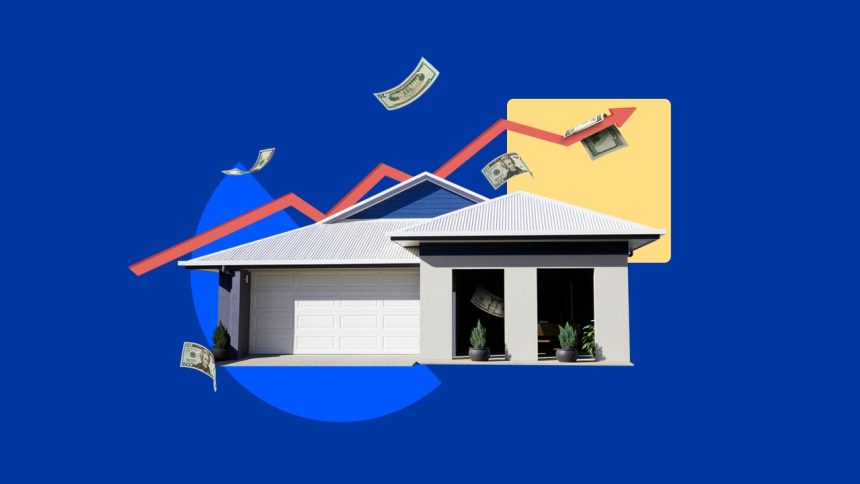Inflation is substantially lower now than at its high point of 9.1 percent in the summer of 2022, but it’s still short of the Federal Reserve’s stated goal of 2 percent. “Progress has been made on inflation, down significantly from the peak,” says Mark Hamrick, Bankrate’s senior economic analyst. “But it is happening at too slow of a pace to satisfy.”
Progress has been made on inflation, but it’s happening at too slow of a pace to satisfy.
— Mark Hamrick, Bankrate Senior Economic Analyst
The Fed has indicated that rate cuts would be coming at some point this year, though likely not as soon as many had hoped. “The battle against inflation has not yet been won, and the Federal Reserve cannot yet declare ‘mission accomplished,’” Hamrick says. Here’s a peek into how inflation affects the housing market.
The housing market and inflation
The shelter category, which includes housing costs, continues to be a major contributor to the CPI’s monthly all-items increase. It rose 0.4 percent from last month and 5.5 percent year-over-year — combined, the shelter and gasoline indexes accounted for more than 70 percent of the monthly all-items increase in April.
Nationally, CoreLogic’s most recent home-price analysis reports that home prices rose 5.5 percent from February 2023 to February 2024. It forecasts that the pace of price growth will ease up into the spring real estate season. “Home price growth pivoted in February, as the impact of the January 2023 Home Price Index bottom finally faded,” said Selma Hepp, CoreLogic’s chief economist, in a statement. “As a result, the U.S. should begin to see slowing annual home price gains moving forward. Nevertheless, spring home price gains are already off to a strong start despite continued mortgage rate volatility.”
Meanwhile, Fannie Mae’s latest Home Purchase Sentiment Index (HPSI) stayed flat in April at 71.9, with more than three-quarters of respondents — 79 percent — saying they believe it’s a bad time to buy a home.
That negative attitude is likely tied to today’s mortgage rates, which have eased a bit since hitting the 8 percent mark in October but remain stubbornly elevated despite lower inflation. The current average 30-year fixed mortgage rate is 7.23 percent, according to Bankrate’s most recent data.
Lawrence Yun, chief economist of the National Association of Realtors (NAR), foresees things calming down by end-of-year: “Mortgage rates will be bouncy week-to-week but will most likely settle toward 6 percent by the year end,” he said in a recent statement.
“A big wildcard this year involves the questions associated with what happens with mortgage rates and the supply of homes for sale,” says Hamrick. “If we see a continued and more substantial drop in mortgage rates, that could in turn compel more current owners to move, putting their homes on the market. Ultimately, that could ease some of the upward pressure on home prices, which would undo some of the damage inflicted on housing affordability over the past several years.”
What it means for buyers and sellers
Among these decidedly mixed signals, should you buy a home now, or wait? What about selling your home now?
For homebuyers
Low inventory remains a problem for potential buyers across the country. According to the most recent existing home sales data from NAR, the country had a 3.2-month supply of housing inventory in March, still significantly below the 5 to 6 months that would be needed for a balanced market.
It’s OK to wait things out instead of buying now to beat further increases, especially if you’re a first-time homebuyer. While you’d be putting off building equity, you might find you’re in a better position to buy in the future, as the market cools and your income can potentially grow.
Even when inflation does come down on a consistent basis, it doesn’t mean prices falling; it just means prices not rising as fast.
— Greg McBride, Bankrate Chief Financial Analyst
“Even when inflation does come down on a consistent basis, it doesn’t mean prices falling; it just means prices not rising as fast,” says Greg McBride, CFA, Bankrate’s chief financial analyst. “For homebuyers, a more modest pace of appreciation, or even a period of stagnant home prices, can allow for incomes to grow further. Rather than stretching too much now, you may be able to buy a bit more comfortably in a couple of years if your income growth outpaces home price growth. But there are no guarantees.”
That said, life circumstances might require you to buy a home now, regardless of market trends, and that’s as good a reason as any. Just make sure you plan to stay in the home for long enough to come out ahead when you eventually sell.
For home sellers
The ongoing housing shortage may provide an opportunity for sellers to get a better price for their homes. This is good news, but keep in mind that if you then need to buy a new home, the tables will turn, and you’ll be subject to the same circumstances — and high mortgage rates — as other buyers.
And remember, location matters. The nationwide median home-sale price was $393,500 in March, according to NAR, but prices vary greatly from one area to the next. So, depending on where you live, you could find fewer takers or need to come down on price.
Homebuying tips when prices are high
If you’re set on buying soon, here are a few ways you can stretch your housing budget:
- Put your down payment savings in a high-yield account: One upside to inflation and the Fed’s many price hikes: higher interest rates on savings accounts. If you aren’t already, put the money you’re saving toward a down payment into a high-yield account. Just make sure the account allows you to access your money easily when it comes time for closing — some online savings accounts take three days to deliver your funds when you withdraw.
- Consider a mortgage lender with low or no fees: While it might be more convenient to get a mortgage at your bank, banks typically charge an origination fee, often 1 percent of the amount you borrow. Many non-bank and online lenders don’t, so if you can find a no-fee lender with attractive rates, you’ll keep more money in your pocket.
- Lock in your mortgage rate: When you find a lender and apply for a loan, ask about locking in your rate. Now’s not the time to take a chance on your monthly mortgage payment suddenly soaring in price, right before you’re set to close.
Read the full article here















